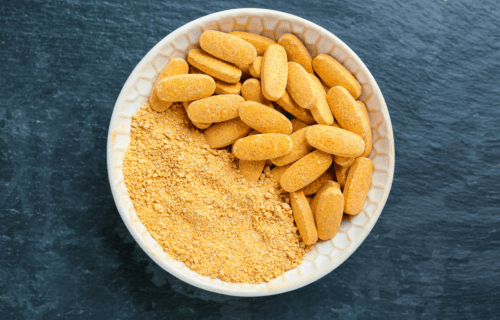
The Truth about Mast Cell Activation Syndrome and Histamine Intolerance
Many people with Histamine Intolerance don’t realize they also have Mast Cell Activation Syndrome.
So, they keep spinning their wheels.
This is certainly what happened for me.
When I was really struggling with not being able to fall asleep. And with a lot of itching. And anxiety. And fatigue…so many symptoms.
I thought I just had Histamine Intolerance.
And I thought I could handle it by getting rid of foods I was reacting to.
So, first I took out all the kombucha, kefir, yogurt, and fermented veggies I was having. That actually helped.
Then I took out tomatoes, eggplant, and mushrooms. That helped too.
But I was still reacting.
So, I took out oranges, bananas, and pineapple. Still I was getting a tiny bit better.
And I kept going…next was lunchmeats, pepperoni, beef and ground meats. This helped too!
So, I kept on taking out foods.
I tracked every food I ate. And whether my symptoms got better or worse.
Have you gone down this rabbit hole of Food Elimination?
I did this for months.
And I got a little obsessed. But my attempts were a bit misguided. Because I didn’t understand about the other triggers I was dealing with.
I had just started hearing about Mast Cell Activation Syndrome. This was several years ago when it was still considered a theory. Before it was accepted in 2016.
But I was resisting having Mast Cell Activation Syndrome. And I definitely didn’t want to take supplements.
I truly believed if I just eliminated all the triggering foods, I could get rid of my symptoms.
Because they were getting better…so it seemed to make sense!
I’m wondering if you might have had a similar experience?
Next, I cut out oxalates. And I got rid of all glutamate foods.
I eventually got down to 10 foods. 20 if you counted salt, pepper, and the herbs I could handle.
And I did feel better for a few short weeks. But it didn’t last.
Can you relate?
It was so hard to keep up with the elimination diet. I couldn’t eat out. And when I went on vacation, I had to bring an electric burner. This was so I could cook my few foods in the hotel room.
Those few short weeks of feeling better didn’t last. I craved foods I used to eat. I even dreamed about foods.
I became very underweight. I had no energy. And my symptoms came back even worse!
I became deficient in a number of nutrients that are needed to make the histamine degrading enzymes. And also in the ones that support the Mast Cells.
The way I got out of this mess was realizing I had Mast Cell Activation Syndrome.
Let’s look at the differences between Mast Cell Activation Syndrome and Histamine Intolerance next.
The Differences between Mast Cell Activation Syndrome and Histamine Intolerance
Histamine Intolerance and Mast Cell Activation Syndrome can produce very similar symptoms.
These are symptoms like:
- Itching
- Rashes
- Hives
- Flushing
- Acid Reflux
- Asthma
- Postnasal drip
- Congestion
- Headaches and migraines
- Anxiety
- Fatigue
- Sleep problems
- Heart Palpitations
- Low blood pressure
So, what are the differences between Histamine Intolerance and Mast Cell Activation Syndrome?
First, let’s look at Histamine Intolerance.
Histamine Intolerance occurs when there is too much histamine in your body. This can happen for 3 major reasons:
- Too much histamine is being consumed
- The Histamine Degrading enzymes aren’t functioning properly
- Too much histamine is being produced by cells like mast cells
And it is often a combination of all of those 3 reasons.
If the Histamine degrading enzymes aren’t working, histamine can build up to high levels and cause symptoms. And Histamine Intolerance can get worse if you consume too many high histamine foods.
Next, let’s look at Mast Cell Activation Syndrome.
Mast Cell Activation Syndrome happens when your immune cells, called mast cells are over-reactive.
Mast Cells have a job in your body to make inflammation. This is to help the immune system get rid of viruses, bacteria, and molds. Mast Cells also help with toxins. And when you get hurt, they help you heal.
So, they are really important in the body. You couldn’t survive without your Mast Cells!
But, when there are long-term infections. Or long-term toxins…your Mast Cells can get dysregulated.
When this happens, the Mast Cells then make way too much inflammation. This is through different chemicals, called mediators.
The best-known Mast Cell Mediator is Histamine. But there are also hundreds of other mediators that can create inflammation too.
In Mast Cell Activation Syndrome, there are usually many more symptoms than Histamine Intolerance. And there are a few other symptom differences.
Symptoms More Reflective of Mast Cell Activation Syndrome than Histamine Intolerance:
- Chemical sensitivity (fragrance, gasoline, new carpet, paint, etc.)
- Lectin Sensitivity (like potatoes, tomatoes, etc.)
- Reacting to food when it’s first put in your mouth
- Hypermobility
- Slow skin healing
- Bone pain
- Severe seasonal allergies
- Rages
- Anaphylaxis
- Autoimmunity
You don’t have to have all those symptoms to have Mast Cell Activation Syndrome. But people with this condition usually have a few of these.
How are Histamine Intolerance and Mast Cell Activation Syndrome Addressed Differently?
When you have Histamine Intolerance, a low histamine diet makes a big difference. People usually start feeling better in 6 weeks.
Also, the enzymes that breakdown histamine often need to be supported.
Both of these steps will clear up Histamine Intolerance, if that’s the only problem.
When you have Mast Cell Activation Syndrome, you have to reduce all the root factors keeping the mast cells over-reactive. So, there is a lot more work to be done.
There are people with Mast Cell Activation Syndrome who don’t have Histamine Intolerance.
But most people I’ve seen with Mast Cell Activation Syndrome also have Histamine Intolerance.
When you have both, a low histamine diet usually helps some. But it doesn’t fix it.
You also have to address all the mast cell triggers.
And one of the biggest next steps for people is to take targeted Mast Cell supporting supplements.
Remember the story I told you at the beginning? About me resisting having Mast Cell Activation Syndrome?
And about me resisting taking supplements?
When I finally realized I had to start taking supplements, that helped me start to turn the corner.
Let’s look at why this is next.
Why Are Supplements Needed in Mast Cell Activation Syndrome?
It would be rare if your Mast Cells could calm back down on their own, once they got dysregulated.
It’s like they get stuck.
And you know how once your car is really stuck in the mud and can’t move anymore…that your car can’t get back out on its own?
So, what do you have to do…you have to get out and dig your car out.
A similar thing happens with the mast cells. Once they get stuck, you have to help them get out again.
When I got so sick, I definitely needed supplements to calm my overactive Mast Cells down.
But, it took me years to figure out which supplements work best in Mast Cell Activation Syndrome. I started by experimenting on myself.
And then I worked with hundreds of people dealing with this. And I learned what tends to be more tolerated. And what helps the fastest.
I talk about this in my upcoming online class called the “Top 8 Mast Cell Supporting Supplements MasterClass.”
If you have Mast Cell Activation Syndrome. And you aren’t sure what supplements to take or how to take them, I really hope you will join me.
You can find out more about the class and register at the Early Bird price by clicking the button below.
(Hurry – early bird price ends soon!)





I’m in the uk , I’m wondering if you could reccomend anyone in the uk who could offer a service identical to yours
Hi Carey, if you email us, we can send you a list of doctors in the UK who are familiar with MCAS.